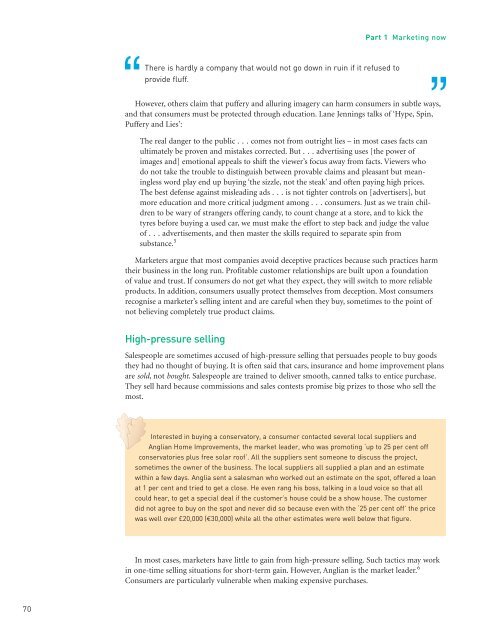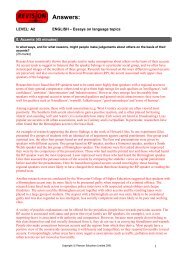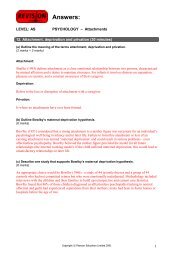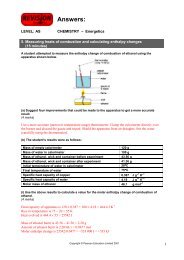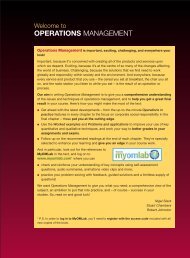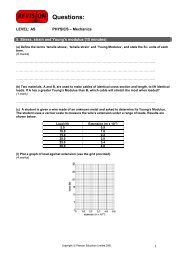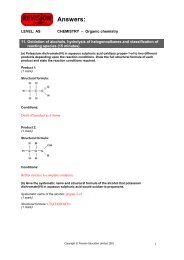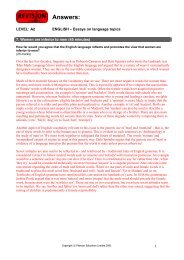The Dove Campaign for Real Beauty - Pearson
The Dove Campaign for Real Beauty - Pearson
The Dove Campaign for Real Beauty - Pearson
Create successful ePaper yourself
Turn your PDF publications into a flip-book with our unique Google optimized e-Paper software.
Part 1 Marketing now“<strong>The</strong>re is hardly a company that would not go down in ruin if it refused toprovide fluff.“However, others claim that puffery and alluring imagery can harm consumers in subtle ways,and that consumers must be protected through education. Lane Jennings talks of ‘Hype, Spin,Puffery and Lies’:<strong>The</strong> real danger to the public . . . comes not from outright lies – in most cases facts canultimately be proven and mistakes corrected. But . . . advertising uses [the power ofimages and] emotional appeals to shift the viewer’s focus away from facts. Viewers whodo not take the trouble to distinguish between provable claims and pleasant but meaninglessword play end up buying ‘the sizzle, not the steak’ and often paying high prices.<strong>The</strong> best defense against misleading ads . . . is not tighter controls on [advertisers], butmore education and more critical judgment among . . . consumers. Just as we train childrento be wary of strangers offering candy, to count change at a store, and to kick thetyres be<strong>for</strong>e buying a used car, we must make the ef<strong>for</strong>t to step back and judge the valueof . . . advertisements, and then master the skills required to separate spin fromsubstance. 5Marketers argue that most companies avoid deceptive practices because such practices harmtheir business in the long run. Profitable customer relationships are built upon a foundationof value and trust. If consumers do not get what they expect, they will switch to more reliableproducts. In addition, consumers usually protect themselves from deception. Most consumersrecognise a marketer’s selling intent and are careful when they buy, sometimes to the point ofnot believing completely true product claims.High-pressure sellingSalespeople are sometimes accused of high-pressure selling that persuades people to buy goodsthey had no thought of buying. It is often said that cars, insurance and home improvement plansare sold, not bought. Salespeople are trained to deliver smooth, canned talks to entice purchase.<strong>The</strong>y sell hard because commissions and sales contests promise big prizes to those who sell themost.Interested in buying a conservatory, a consumer contacted several local suppliers andAnglian Home Improvements, the market leader, who was promoting ‘up to 25 per cent offconservatories plus free solar roof’. All the suppliers sent someone to discuss the project,sometimes the owner of the business. <strong>The</strong> local suppliers all supplied a plan and an estimatewithin a few days. Anglia sent a salesman who worked out an estimate on the spot, offered a loanat 1 per cent and tried to get a close. He even rang his boss, talking in a loud voice so that allcould hear, to get a special deal if the customer’s house could be a show house. <strong>The</strong> customerdid not agree to buy on the spot and never did so because even with the ‘25 per cent off’ the pricewas well over £20,000 (€30,000) while all the other estimates were well below that figure.In most cases, marketers have little to gain from high-pressure selling. Such tactics may workin one-time selling situations <strong>for</strong> short-term gain. However, Anglian is the market leader. 6Consumers are particularly vulnerable when making expensive purchases.70


